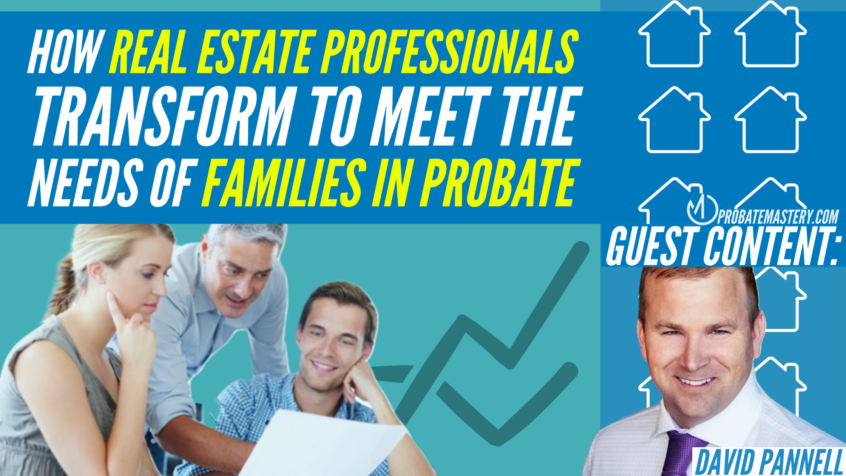Guest Post by David Pannell, Broker at Cities Real Estate
Everyone knows that the word transaction means “an instance of buying or selling something; a business deal.” You may have had a transaction with a real estate agent when you bought or sold a home or a piece of property. If there were no extenuating circumstances with the deal, you probably had a positive experience with your agent.
Unfortunately, when it comes to probate, many homeowners can’t say the same about the transaction they had with their realtor as an estate was being settled. Maybe their realtor was uneducated about the process, or unprepared for the amount of emotional work that would be involved to make it a positive experience for the client.
The truth is, many probate transactions are treated that way – like they are just a business deal.
The good news is that many of today’s real estate agents have transformed from transactional agents to knowledgeable and caring probate real estate professionals. Let’s take a look at how some agents invest in themselves to evolve and develop into an asset for families in probate.
Probate is Complex and Deserves Recognition from Real Estate Agents
A true professional gives more than just a transaction; they want to do the absolute best job they can for their clients. Dedicated, professional real estate agents wish to give accurate instructions and recommendations to clients, particularly those involved in more complex real estate transactions. They want to go the extra mile. This is why some real estate agents have evolved into “probate real estate agents.”
Through experience, agents learned that the probate process concerning real estate is very complex and that they had to develop the skills and acquire the knowledge necessary to satisfy their clients’ needs.
And through conversations and transactions, clients and probate attorneys recognized that very few realtors had probate experience. With real estate typically being the most significant asset in an estate, they wanted to work with agents that spoke the language of probate and could bring their experience and expertise to the table. Astute real estate agents saw the opportunity to add value to clients and their probate attorneys.
Some dedicated real estate agents have taken the time to receive specialized training in probate and have received the Certified Probate Expert (CPE) designation.
There are many benefits of working with a certified probate real estate agent:
- CPEs understand the language of probate and can explain the process and key terms, so clients understand and know what to expect.
- CPEs are familiar with Estates Code in their regions, court process, timeline, and deadlines.
- CPEs follow best practices to market and sell the property quickly and for the highest value.
- CPEs network with other professionals to assist with the various stages of the probate process.
- CPEs maintain a chain of communication to all parties when vital decisions need to be made.
Agents motivated to help people going through the probate process continue to learn through the probate mastermind community, as well as taking advantage of materials and regulations pertaining to their specific state, or conferences that address probate procedure and laws.
Does it Matter if Your Realtor Has Probate Experience?
Just like you would see a specialist if recommended by your doctor, probate is a specialty in real estate that even lawyers will recommend using.
According to the American Bar Association “Probate is the court-supervised legal procedure that determines the validity of your will. All property, debts, and claims of the estate are inventoried and appraised. All valid claims of the estate are collected, and the remainder is distributed to beneficiaries according to the will.”
Unless your loved one who has passed away made arrangements to avoid probate, like a living trust, before they died, most of the assets in the estate will need to go through the probate process. This includes the family home and any other property owned by the decedent.
If I Have a Probate Lawyer Why Do I Need a Probate Real Estate Agent?
Even the most straightforward probate sale (that resembles a traditional home sale) has nuances that need to be done according to the probate laws in your state.
You can use a traditional real estate agent for most real estate transactions, but a probate property requires some additional experience on the part of your agent. For example:
- Using probate-specific forms when completing the sale
- Checking over documents concerning the probate sale
- Specialized appraisals to establish the property’s date of death value
- Adhering to a probate timeline from the court
An experienced probate real estate agent will know these probate-specific procedures, timelines, and deadlines that a regular agent won’t—preventing expensive mistakes that could delay the proceedings. Let’s go into more information on each:
A non-probate certified real estate agent may not know the correct probate procedures or to use probate-specific forms when completing the sale. If these forms are incorrect at your final petition hearing, the probate judge will not close out probate. The need to make even minor corrections can lead to rescheduling new hearings weeks or months down the line.
If you don’t have a probate real estate agent, you’ll need to rely on your probate attorney to check over documents concerning the probate sale to make sure the courts will approve it. For this reason, your probate attorney may require you to work with a probate-certified real estate agent. Attorney’s fees can get very expensive when they’re spending countless hours completing the work that an experienced probate agent would do as part of their standard commission.
In cases where estate taxes are due, you may need to get a specialized appraisal to establish the property’s date of death value. A probate agent will be aware that this is necessary for your particular situation and have relationships with reputable estate appraisers.
Probate sales have a definite timeline that must be adhered to—especially if court confirmation is required. This can be a very complex process in which the probate property is sold through an auction-like proceeding called the overbidding process.
Before the court confirmation hearing, you and your agent need to list the home and accept an offer. In many states, you then must relist the property at the accepted offer price for 30-45 days.
How Do I Find a Probate Agent?
It’s never easy to bring up topics related to the death of a loved one in casual conversation, so you’re unlikely to find a good probate agent by word of mouth. Your probate attorney—having worked with various agents on numerous cases—is a good option for personal recommendations.
3 Questions to Ask Probate Real Estate Agents Before Hiring One:
Once you’ve settled on a few agents you think you can work with, you’ll need to know the right questions to ask to help you select the right agent.
“Have you ever sold probate real estate before?” is a great way to start, but it’s not nearly enough. You need to ask open-ended questions that invite the prospective agents to go into detail about their experience. Here are several good questions to ask:
1. How many probate transactions have you handled?
By asking how many transactions they’ve handled, you’re really providing the agents with the opportunity to tell you a few stories about specific properties they’ve sold.
If they don’t go into detail about probate transactions on their own, follow up by asking about their best and worst probate sale experiences. This will provide you with insight into what steps they’ll be taking to ensure that things go smoothly and how they’ll be handling any difficulties that arise.
This is also an excellent time to ask them for references from past clients that you can contact. By calling these clients, you’ll get helpful feedback from people who’ve successfully completed their probate sales.
2. How do probate sales and traditional sales differ?
If you’ve done your homework and have already spoken with your probate attorney, you might consider not asking this question when interviewing prospective agents. You don’t want to do this.
Even if you’re pretty confident that you know the differences, this question isn’t about the answer itself. What you want to see is their ability to explain this complex process in an understandable way.
Selling real estate during probate is a very complex process within the overall probate process. It’s quite probable that difficulties will arise during the sale, so you need to be sure that your probate agent can clearly communicate important issues with you.
3. Are you certified or educated in probate?
Experience selling probate real estate in the area where the property is located is an important qualification your agent needs to have. Also, it will give you peace of mind if your agent has probate-specific training or certification.
Do this Before You Hire Your Probate Real Estate Agent
Before you sign a listing agreement, ask your chosen agent to attend a meeting with you and your probate attorney. The average probate process lasts six to nine months, so you want to be sure all three of you can work together as a team.
Selling the home of a dearly departed family member can be a heartbreaking step to take. But having the right probate real estate agent on your side can make that challenging task a bit easier to bear.
Don’t Go It Alone, Get Probate Help from Professionals
Settling an estate from a loved one can be particularly traumatic if you had a close relationship. Grieving can make the estate sale process difficult to manage and navigate. It’s essential not to try and travel down this road alone. Seek help and advice from caring professionals, close friends, and family members. Surrounding yourself with a strong support network will be invaluable for you throughout this process.
Understanding that this process will unleash a roller coaster of emotions will help you at the outset to anticipate the bumpy road ahead. Grief can be an overwhelming feeling, so be prepared for unexpected bouts of tears or anger and know that these feelings are a normal part of the process.
About David Pannell – Certified Probate Expert
David grew up watching his mother invest in, remodel and sell properties. This gave him an understanding of what it takes to sell a home for top dollar. Before entering real estate in 2005, David served in the United States Marine Corps and later worked for Arlington Police Department as a police officer.
David leads a new breed of Realtors® who are leveraging technology to sell real estate. David uses the latest WEB 2.0, social media, video marketing, and extensive networking to lead the field when it comes to innovative ideas and cutting-edge marketing strategies to make your real estate experience completely interactive.
There is no cost or obligation to discuss your options. For more information, go to Cities Real Estate website to schedule a no-risk consultation.

